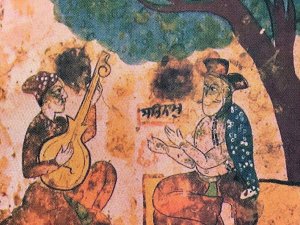About the Author
Sarbpreet Singh is a poet, playwright, and commentator with a career in technology. He writes a column for sikhchic.com, and his commentary has appeared elsewhere, including NPR's Morning Edition, the Boston Herald, the Milwaukee Journal Sentinel and the Providence Journal. He is the founder and director of the Gurmat Sangeet Project, a non-profit dedicated to the preservation of traditional Sikh music. He also serves on the boards of several non-profits focused on service and social justice and has been recognised for his interfaith work.
Book Review: The Camel Merchant of Philadelphia
By Ek Ong Kaar Khalsa Michaud
Sarbpreet Singh is my kind of historian. He knows, instinctively, that history is ultimately about "story." And stories first come from the minds of the people who witnessed the events - complete with the filters and agendas of the storytellers. What we write, decades or centuries later, as "history" is really just our retelling of those original stories, with our own filters and agendas added to the mix.
When I heard that Sarbpreet Singh was publishing a book called The Camel Merchant of Philadelphia focusing on stories from the court of Maharaja Ranjit Singh, I felt truly excited. I had read a bit of history relating to the Maharaja. Yet, some of the writings about this figure seemed so weighted by the political concerns of the Sikhs today, that I never quite got the glimpse into the past I had hoped for.
Sarbpreet Singh's book promised a different view. A view of records kept by contemporaries about Maharaja Ranjit Singh and his inner circle. This unedited insight into Ranjit Singh's court, by friends and foes alike, had the potential to be an accessible and authentic rendition of his story.
Digging into The Camel Merchant of Philadelphia, I found myself swept into another world. A world of intrigue, of colorful characters, of extreme wealth, of war, and ultimately a world of heart-break and betrayal.
A few sections of the book, in the beginning, read a little slow, where Sarbpreet Singh dutifully lays out the dynastic stories that surround the rise of Ranjit Singh. Yet, when the stories focus on particular individuals within Ranjit Singh's world, the narrative takes flight.
General Josiah Harlan - the Camel Merchant of Philadelphia who began life as a Quaker, achieved prominence within Ranjit's court and then turned into an ardent enemy of the Maharaja, scheming against him. Moran - a 13 year old Muslim dancing girl and courtesan who became one of Ranjit Singh's wives, much to the horror of the Akalis; Sada Kaur - a formidable Queen Warrior in her own right, whose daughter became Ranjit Singh's first wife, and whose military and political brilliance helped secure his rise to power.
These are but a few of the characters through whom Sarbpreet Singh examines Ranjit Singh's world.
The records about and sometimes written by these characters create a fascinating tableau. Sarbpreet Singh weaves the historical accounts together in true story-teller fashion: setting the scene, commenting on the emotional texture of what happened, reading between the lines and sometimes musing on "what could have been."
All of this combined makes The Camel Merchant of Philadelphia a tantalizing and fascinating read.
I enjoyed this very accessible and informative work on Ranjit Singh's court. At the same time, the stories created for me a sense of loss. We do not often analyze history through a theological lens, to see the places where our ancestors failed themselves, or failed the future, by not fully embodying the ideals the Gurus gave us.
However, as I read the stories, I couldn't help applying that lens myself. Sada Kaur - who clearly had so much intelligence and strength on her own. Why couldn't she have risen to prominence as the leader of the Sikh community at that time? Why did she need a son-in-law in whom to invest her talent, her heart, her dreams? In feminist theory, there is a term called "male-identified." It is when a woman cannot own her own power completely, but needs to merge and project her power through a close male relation: a father, a husband, a son, a lover. Sada Kaur seems to me to be a historical figure caught between the Guru's promise of sovereignty to women, and a culture that both used and resented her strength.
The fact that she lived her last days a political prisoner of the Maharaja, embittered and betrayed, is a moral lesson in and of itself.
Yet nothing was as heart-breaking as the telling of the fall of the Sikh Empire in December of 1845. The Sikhs had the British on the verge of surrender. Tej Singh arrived on the scene, with his troops fresh and eager for combat. But Tej Singh did not throw his might behind the Sikh cause. Instead, he had brokered a deal secretly ahead of time to betray the Sikhs in order to secure his own wealth, place and position with the British.
I recently learned a Punjabi word: Dubaajaraa. It is an insulting term, and refers to someone who uses his or her connections to spread lies, to manipulate people, and to play people against one another for his own agenda. The Sikhs had the chance to defeat the British. Instead, the culture of manipulation and intrigue embodied in the historical figure of Tej Singh caused the Sikhs to defeat themselves.
How would the world be different today if the Sikhs had stayed united? What if the British had been defeated then and there? Would there have ever been Partition? Would we be seeing the existence of ISIS today? What was the cost of that "dubaajaraa" decision made by Tej Singh?
Sarbpreet Singh's narrative does not delve into such soul-searching questions. On the contrary, he tells the story in a way that keeps the reader engaged, entertained and eager to turn the page. Yet there is no way to read the record of Mahara Ranjit Singh's court without experiencing his story as both comedy and tragedy. On the one hand, it was truly an amazing time in history for the Sikh community. On the other hand, so many opportunities to embody the full values of the Guru's teachings simply got lost. And that loss had significant consequences.
In any case, The Camel Merchant of Philadelphia is a must-read for anyone interested in 19th century Sikh and British history.
The Camel Merchant of Philadelphiaby Sarbpreet Singh is published by Westland Publications Private Limited. Copyright 2019.






